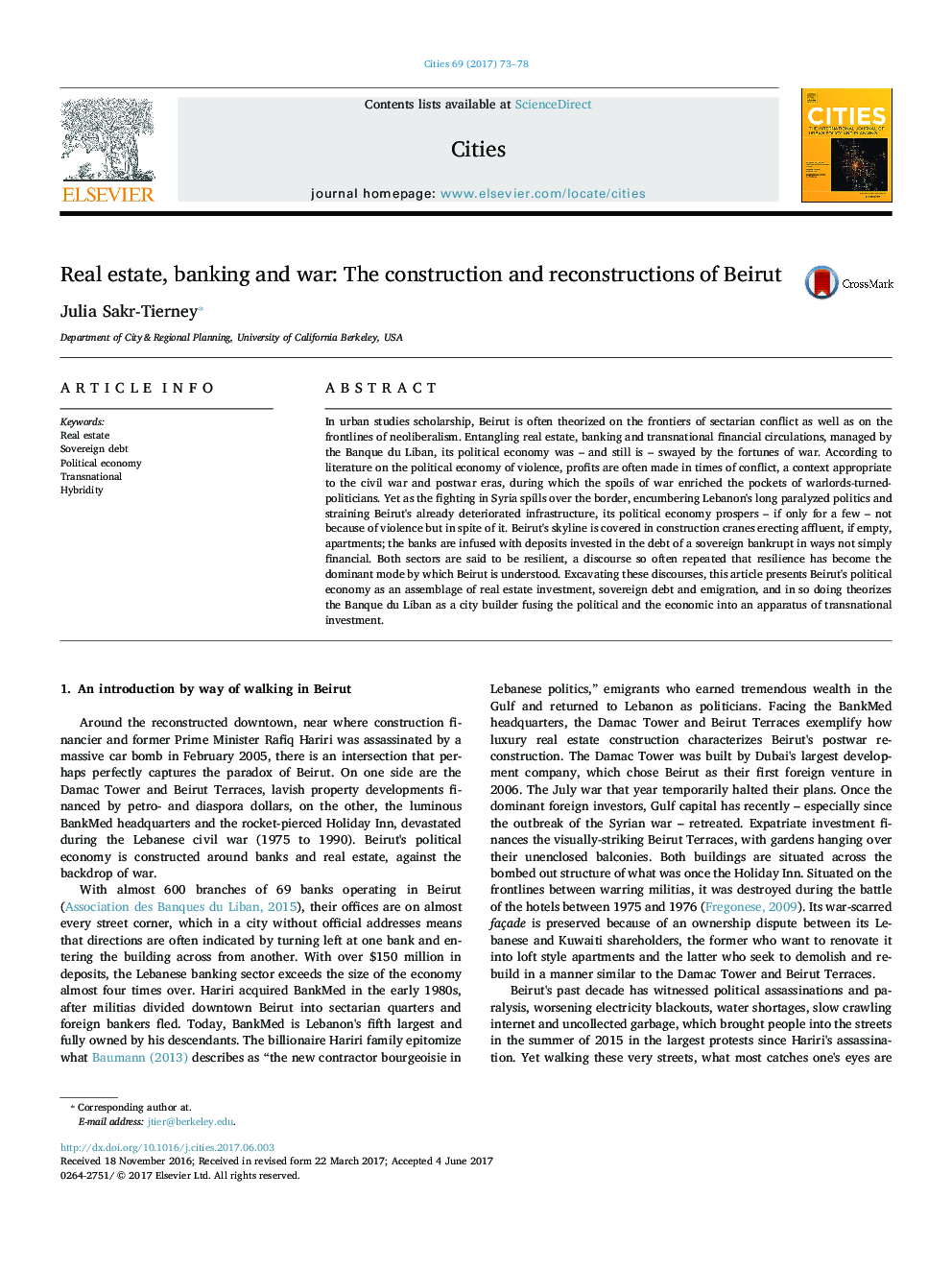| کد مقاله | کد نشریه | سال انتشار | مقاله انگلیسی | نسخه تمام متن |
|---|---|---|---|---|
| 5108027 | 1482327 | 2017 | 6 صفحه PDF | دانلود رایگان |
عنوان انگلیسی مقاله ISI
Real estate, banking and war: The construction and reconstructions of Beirut
ترجمه فارسی عنوان
املاک، بانکداری و جنگ: ساخت و ساز و بازسازی بیروت
دانلود مقاله + سفارش ترجمه
دانلود مقاله ISI انگلیسی
رایگان برای ایرانیان
کلمات کلیدی
مشاور املاک، بدهی دولتی، اقتصاد سیاسی، بین المللی، هیبریدی،
ترجمه چکیده
در بورس تحصیلی شهری، بیروت اغلب در مرزهای جنگ های فرقه ای و همچنین خط مقدم نئولیبرالیسم تئوری می شود. سرمایه گذاری در املاک و مستغلات، بانکداری و امور مالی فراملیتی، تحت مدیریت بنکیو لیبان، اقتصاد سیاسی آن بود - و هنوز هم - به وسیلۀ بحران جنگ رخ می دهد. براساس ادبیات اقتصادی اقتصادی خشونت، اغلب در زمان جنگ، مفاهیم متناسب با جنگ داخلی و دوران پس از جنگ، که در آن جنگهای داخلی جنگجویان سیاستمدار را غنی سازی کردند، اغلب سود می کنند. با این حال، همانطور که جنگ در سوریه بیش از مرز نابود می شود و به سیاست های طولانی فلج شده لبنان منجر می شود و زیربنای زودگذر بیروت را تحت تأثیر قرار می دهد، اقتصاد سیاسی آن، اگر نه فقط برای چند نفر، نه به خاطر خشونت بلکه به رغم آن، خوش شانست. خط افق بیروت در ساخت جرثقیل های احداث باقی مانده، در صورت خالی، آپارتمان ها؛ بانک ها با سپرده های سرمایه گذاری شده در بدهی یک ورشکسته دولتی به نحوی که صرفا مالی نیستند، تزریق می شود. گفته می شود که هر دو بخش مقاوم هستند، گفتوگو اغلب تکرار می شود که انعطاف پذیری به حالت غالب تبدیل شده است که بیروت درک می شود. در این مقاله، این مقاله اقتصاد بیروت را به عنوان مجموعه سرمایه گذاری املاک و مستغلات، بدهی های حاکم و مهاجرت معرفی می کند و با این کار، بانک دی لیبان را به عنوان سازنده ی شهر متصل می سازد که سیاست و اقتصاد را به دستگاه سرمایه گذاری فراملی تبدیل می کند.
موضوعات مرتبط
علوم انسانی و اجتماعی
مدیریت، کسب و کار و حسابداری
گردشگری، اوقات فراغت و مدیریت هتلداری
چکیده انگلیسی
In urban studies scholarship, Beirut is often theorized on the frontiers of sectarian conflict as well as on the frontlines of neoliberalism. Entangling real estate, banking and transnational financial circulations, managed by the Banque du Liban, its political economy was - and still is - swayed by the fortunes of war. According to literature on the political economy of violence, profits are often made in times of conflict, a context appropriate to the civil war and postwar eras, during which the spoils of war enriched the pockets of warlords-turned-politicians. Yet as the fighting in Syria spills over the border, encumbering Lebanon's long paralyzed politics and straining Beirut's already deteriorated infrastructure, its political economy prospers - if only for a few - not because of violence but in spite of it. Beirut's skyline is covered in construction cranes erecting affluent, if empty, apartments; the banks are infused with deposits invested in the debt of a sovereign bankrupt in ways not simply financial. Both sectors are said to be resilient, a discourse so often repeated that resilience has become the dominant mode by which Beirut is understood. Excavating these discourses, this article presents Beirut's political economy as an assemblage of real estate investment, sovereign debt and emigration, and in so doing theorizes the Banque du Liban as a city builder fusing the political and the economic into an apparatus of transnational investment.
ناشر
Database: Elsevier - ScienceDirect (ساینس دایرکت)
Journal: Cities - Volume 69, September 2017, Pages 73-78
Journal: Cities - Volume 69, September 2017, Pages 73-78
نویسندگان
Julia Sakr-Tierney,
